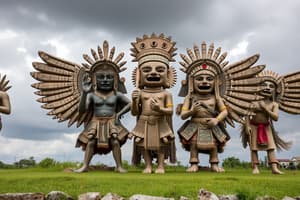Podcast
Questions and Answers
What characterized the lifestyle of the people in the Great Plains and Great Basin in North America?
What characterized the lifestyle of the people in the Great Plains and Great Basin in North America?
- Living in cliff dwellings for protection
- Sedentary, living in one place for a long time
- Fishing and trading exclusively
- Nomadic, moving from one place to another (correct)
What was Christopher Columbus searching for during his second arrival in the New World?
What was Christopher Columbus searching for during his second arrival in the New World?
- The Fountain of Youth
- Gold among the natives (correct)
- New trade routes to Asia
- Spices and other luxury goods
What was the main contribution of Prince Henry the Navigator to European exploration?
What was the main contribution of Prince Henry the Navigator to European exploration?
- He led the first expedition to the New World
- He led the Reconquista in Spain
- He developed the astronomical table
- He used sea-based trade routes to reach Asia (correct)
What was unique about the Iroquois people compared to other Native American tribes?
What was unique about the Iroquois people compared to other Native American tribes?
What was the name of the Norse explorer who led one of the earliest European expeditions to North America?
What was the name of the Norse explorer who led one of the earliest European expeditions to North America?
What was the primary method of agriculture used by the Aztecs to cultivate crops in central Mexico?
What was the primary method of agriculture used by the Aztecs to cultivate crops in central Mexico?
What was the name of the ancient Native American culture that thrived in the southwestern United States, mainly in the Four Corners region?
What was the name of the ancient Native American culture that thrived in the southwestern United States, mainly in the Four Corners region?
What was the name of the structure in Tikal that embodies Mayan myth along with natural astronomical cycles?
What was the name of the structure in Tikal that embodies Mayan myth along with natural astronomical cycles?
What was the name of the written language used by the Aztecs?
What was the name of the written language used by the Aztecs?
What was the primary crop used to sustain the civilization of the Inca empire?
What was the primary crop used to sustain the civilization of the Inca empire?
Flashcards are hidden until you start studying
Study Notes
Native American Societies Before Columbus
- Native Americans organized themselves into various cultures based on their geographic location.
- Prior to the arrival of Europeans, the Americas were inhabited by a diverse group of people.
Central and South America
- Aztecs or Mexica: a Mesoamerican culture that thrived in central Mexico from 1300 to 1521, comprising various ethnic groups.
- Chinampas: "floating gardens" made by stacking mud, lake sediment, and decomposing plants to create small elevated land plots, separated by canals.
- Maya: a culture that flourished in present-day Guatemala, renowned for their achievements in agriculture, pottery, writing, calendars, and mathematics.
- Tikal: a Mayan city with a water purification system and the famous El Castillo (Temple of Kukulcan), which embodies Mayan myth and natural astronomical cycles.
- Pyramid of the Magician/Dwarf/Soothsayer (Casa el Adivino): a significant structure in Mayan architecture.
- Aztec Written Language: Nahuatl.
- Inca: the largest empire in pre-Columbian America, sustained by maize (corn).
- Centeotl: the Corn God of the Aztecs.
- Hun-Hunahpu: the Maize God of the Mayan.
North America
Southwest
- Ancestral Puebloans (Anasazi): an ancient Native American culture that thrived in the southwestern United States, mainly in the Four Corners region.
- Sedentary: they lived in one place, with established settlements like Mesa Verde.
- Mesa Verde: cliff dwellings that served as homes for the Ancestral Puebloans, providing protection from the elements and invaders.
Great Plains & Great Basin
- Nomadic: people who moved from one place to another, without permanent settlements.
- Hunter-gatherer: people who lived by hunting and gathering food.
- Ute People: an indigenous tribe of the Great Basin, who traveled using known routes like the Ute Trail.
Pacific Northwest
- Fishing Villages: Chinook People were famous as traders, with connections stretching as far as the Great Plains.
- Chumash People: first settled 13,000 years ago, experienced population growth and adaptation to the local environment.
- Villages along the coastline, islands, and interior traded resources.
Southeast
- Hopewell People: centered in Ohio and Illinois, advanced in mound-building and agriculture, characterized by geometric earthworks, large burial mounds, corded pottery, ornamental knives, and extensive trading.
- Cahokia People: known for their sophisticated and expansive urban center, marked by the Cahokia Mounds.
- Iroquois People: known for their elaborate systems for choosing leaders and making important decisions.
European Exploration
- Europeans explored the Americas due to population increase, political unification, and desire for luxury goods.
- Portugal: the major player in using sea-based trade routes to Asia, led by Prince Henry the Navigator.
- Caravels: small 15th and 16th-century ships used for exploration.
- Astronomical Table: a tool designed to facilitate the calculation of planetary positions, lunar phases, eclipses, and calendrical information.
- Reconquista: the military campaign to remove Muslims from Spain.
- Christopher Columbus: an Italian explorer and navigator who led four voyages to the Americas, starting in 1492.
- Vikings in North America: the Norse explorer Leif Eriksson, who led one of the earliest European expeditions to North America.
Studying That Suits You
Use AI to generate personalized quizzes and flashcards to suit your learning preferences.




